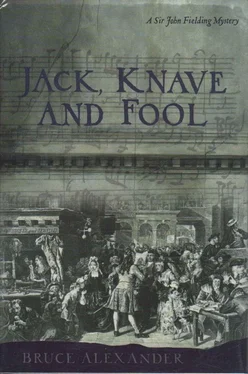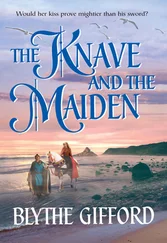Bruce Alexander - Jack, Knave and Fool
Здесь есть возможность читать онлайн «Bruce Alexander - Jack, Knave and Fool» весь текст электронной книги совершенно бесплатно (целиком полную версию без сокращений). В некоторых случаях можно слушать аудио, скачать через торрент в формате fb2 и присутствует краткое содержание. Год выпуска: 1999, ISBN: 1999, Жанр: Исторические приключения, на английском языке. Описание произведения, (предисловие) а так же отзывы посетителей доступны на портале библиотеки ЛибКат.
- Название:Jack, Knave and Fool
- Автор:
- Жанр:
- Год:1999
- ISBN:9780786217984
- Рейтинг книги:4 / 5. Голосов: 1
-
Избранное:Добавить в избранное
- Отзывы:
-
Ваша оценка:
- 80
- 1
- 2
- 3
- 4
- 5
Jack, Knave and Fool: краткое содержание, описание и аннотация
Предлагаем к чтению аннотацию, описание, краткое содержание или предисловие (зависит от того, что написал сам автор книги «Jack, Knave and Fool»). Если вы не нашли необходимую информацию о книге — напишите в комментариях, мы постараемся отыскать её.
Jack, Knave and Fool — читать онлайн бесплатно полную книгу (весь текст) целиком
Ниже представлен текст книги, разбитый по страницам. Система сохранения места последней прочитанной страницы, позволяет с удобством читать онлайн бесплатно книгу «Jack, Knave and Fool», без необходимости каждый раз заново искать на чём Вы остановились. Поставьте закладку, и сможете в любой момент перейти на страницу, на которой закончили чтение.
Интервал:
Закладка:
When we appeared at his open door, Mr. Garrick leapt from the chair on which he sat at his dressing table. As he greeted us, he made a rather strange appearance, for on one side of his face — the left side, as I recall — he wore still his dark stage makeup, and on the other, which had been wiped clean, his natural ruddy complexion shone forth. He looked half a Moor and half an Englishman. I happened to glimpse Annie’s face as she beheld him; she seemed quite shocked. Had she supposed the man onstage truly to have been a Moor?
Sir John inquired after the couple who had preceded us. “German, were they?” he asked. “I’d known you had a following in France. Has your great reputation traveled even farther?”
Mr. Garrick smiled modestly and bowed his head a bit. “I know naught of France,” said he. “And in general, I would say that when I am introduced on the Continent, I may as well be a greengrocer for all they have heard of me. No, Sir John, the two, man and wife, are Austrian, distant cousins of my wife. But as you say, they are Germans more or less, and as such are greatly gifted at finding fault. They offered a number of suggestions as to how my performance might be improved, even offered a bit of advice to the playwright.”
“To Shakespeare?” Sir John gave a short, scoffing laugh at the notion. “Well, I daresay they must be taught respect. One wonders how much they truly understood.”
“Indeed, but their objection was more fundamental. They thought it all wrong that this tragic hero should be African.”
“Ah, how little they know of the world — or of human nature. But David, dear fellow, I know I speak for all of us when I say that your performance could not have been bettered.”
We joined in general agreement to that. And again, Mr. Garrick blessed us with a smile, perhaps a little less modest this time, yet the bow he offered was truly a bow; his hands were clasped before him in a gesture of earnestness.
“You’re too kind, all of you. In truth, I am no judge of my own performances, for once I am up there on the stage I become quite transported in the beauty of the great poet’s language. I do feel, though, that I played well enough, considering I did the whole of it on a gouty foot.”
(I had, by the bye, noted that standing before us he seemed to favor one leg over the other, supporting himself on the left side by keeping a firm grasp on the back of the chair from which he had risen.)
“We’d no ideal” said Sir John. “Do sit down, please.”
“Yes, I fear I must take next month off and give it a rest.”
In the moment it took him to resume his seat upon the chair, Lady Fielding ventured to say, “Mr. Garrick, there is one of our number who exceeded us all in her appreciation of the play and the player. I have never seen such copious tears.”
“All shed in good cause, Lady Fielding,” said he, “for it is indeed a beautiful and terrible tragedy. But who is this person you speak of? “
So saying, he fixed his eyes upon Annie, who seemed to shrink back almost in terror at being presented to so grand a personage. Nevertheless, Lady Fielding put her hand firmly on the girl’s elbow and brought her forward.
“She is our cook, Annie Oakum, and very capable she is, notwithstanding her young years. This night was her first experience of the theater.”
Annie stumbled slightly as she bobbed down in a curtsy. For a long moment she was quite tongue-tied, but then at last: “Pleased I am to meet’cha, sir.”
“Ah, a good cook are you, Mistress Annie?” said Mr. Garrick, smiling indulgently. “Then you shall have no trouble making a good marriage, rest assured.”
“I …” Annie began, stopped, then blurted out: “That is not my intention, sir.”
“Not marry? What a shame, a pretty girl like you.”
“Perhaps someday, sir, but I have an ambition.”
“And what is that?”
“To be an actress on the stage. One day I shall be Desdemona.”
At that we all laughed — and I with the rest. It was not meant cruelly, of that I am certain. We did but laugh in surprise.
Always considerate, Lady Fielding hastened to make things right. “Do forgive us, dear Annie, but we had heard naught of this before.”
Annie turned to her with a great blush reddening her cheeks. “You could not’ve, mum, for I’ve decided just tonight.”
Then did Mr. Garrick fix her with a most sober look. “I must say, my dear girl, that half the young ladies who visit me after a performance make declarations such as the one you have just made. I tell them, as I tell you now, that to be on the stage is not near so grand a lark as it looks to be. To be an actor or an actress requires more than a wish. You must needs have talent. You must be willing to work hard. And you must learn to take disappointment. It is a harder life than ever you’d guess.”
Annie returned to him a look ever as grave as he had given her. “I thank you for your caution, sir,” said she to him, “but I shall be chosen.”
Of all of us assembled there, I believe it was I who took her words most in earnest.
Next day she would have me read Othello to her. That took hours snatched from our tasks parceled out over a few days. Then would she hear Romeo and Juliet, which she adored. And so on, through most, if not all of them. I did not begrudge her time spent thus. I quite enjoyed reading the plays aloud, for Shakespeare’s words are, after all, meant to be spoken. I had performed the same service for Sir John. I had read to him A MuXmmmerNigkt‘4 Dream and had begun his brother’s romance Tom Jones, though we had not got beyond the first volume of that long book when his marriage to Katherine Durham intervened — and there we had left it, though I pressed on alone and finished it.
But as the year 1770 drew to a close and I continued with Annie our journey through the works of the Great Poet, she got it in her head one day to dispense with my services. Here is how she put it to me:
“Jeremy,” said she, “if I’m to be an actress, it will not be enough to know the plays from having heard them read, now will it?”
“I suppose not.”
“I must know how to read them myself.” Then did she give me a hard look. “I want you to teach me how to read.”
Thinking upon that, I had not the slightest notion of how to go about it. I myself had no memory of how I had come by that knowledge; it seemed to me that I had simply begun to read-and at quite an early age. I could recall going to my mother or my father and asking what this word meant, or that, but as to when or how any sort of fundamental instruction had taken place, that was simply lost to me. All this I explained to her, yet she was not to be so easily denied.
“An idea has come to me,” said she. “Here we sit face-to-face at the kitchen table. You read, and I listen. What if I sat next you, and you were to point to the words as you read them? Then I would remember them and soon be able to read them myself. How does that strike you?”
Absent any better method, I thought hers worth a try. And so we rearranged ourselves at the table and began. With what play we made the experiment I cannot recall. Yet I do well remember the tediousness of working through it line by line and word by word. She would often stop me and demand to know why a word — oh, such as “bear” or “will”-would mean something in one place and something quite different in another, or “the” was written thus most of the time, but sometimes expressed simply as “th" Because she had a quick mind and a good memory, she interrupted constantly and quite drove me to distraction. She asked questions that I couldn’t properly answer, and that made her distrust my abilities as a teacher; I distrusted them myself. Gone was the considerable pleasure I had derived from reading the plays aloud. Each day with her became a struggle and a torment. We were often cross with each other.
Читать дальшеИнтервал:
Закладка:
Похожие книги на «Jack, Knave and Fool»
Представляем Вашему вниманию похожие книги на «Jack, Knave and Fool» списком для выбора. Мы отобрали схожую по названию и смыслу литературу в надежде предоставить читателям больше вариантов отыскать новые, интересные, ещё непрочитанные произведения.
Обсуждение, отзывы о книге «Jack, Knave and Fool» и просто собственные мнения читателей. Оставьте ваши комментарии, напишите, что Вы думаете о произведении, его смысле или главных героях. Укажите что конкретно понравилось, а что нет, и почему Вы так считаете.












